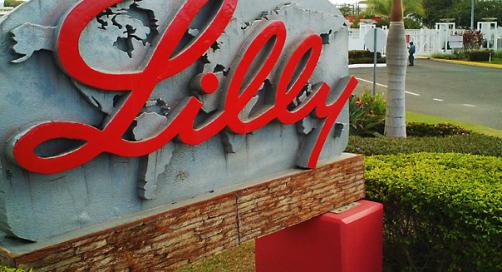
Lilly drug improves lung cancer survival
pharmafile | February 21, 2014 | News story | Research and Development, Sales and Marketing | NSCLC, lilly, necitumumab, ramucirumab
Eli Lilly is patting itself on the back after a global late-stage trial of its investigational drug improved survival in patients with non-small cell lung cancer (NSCLC).
Lilly plans to submit data to regulators this year after the REVEL study found ramucirumab (IMC-1121B) with docetaxel chemotherapy in patients with second-line NSCLC, produced a statistically significant improvement in the primary endpoint of overall survival – compared to those patients treated with placebo plus docetaxel.
The drug, which blocks the vascular endothelial growth factor (VEGF) receptor 2, is one of three launches that Lilly plans for this year, and the third time this drug has produced promising results.
The first, which studied ramucirumab in gastric cancer as a single agent, is the basis for regulatory submissions in the US and Europe, while the second, in combination with paclitaxel for gastric cancer, forms part of a planned submission this year.
The latest REVEL trial looked at 1,200 people whose lung cancer has progressed after failure of prior platinum-based chemotherapy for locally advanced or metastatic disease.
The study, which included non-squamous and squamous NSCLC patients, also found the combination helped with progression-free survival.
This version of the disease accounts for most cases of lung cancer, which is the leading cause of cancer-related mortality worldwide.
“Despite currently available therapies, there continues to be a need for new second-line treatment options,” said Richard Gaynor, senior vice president, product development and medical affairs for Lilly Oncology.
“REVEL is the first positive Phase III study of a biologic in combination with chemotherapy to demonstrate improved overall survival compared to chemotherapy alone in second-line non-small cell lung cancer,” he added.
Fast track status
Lilly, which acquired the experimental drug when it bought ImClone Systems in 2008, plans to present information from REVEL at a future scientific meeting.
“These data reinforce our confidence in the overall ramucirumab development programme, in which we have several Phase III and earlier-Phase studies in multiple tumour types, both as a single agent and in combination with other therapies,” Gaynor concluded.
Ramucirumab has received fast track designation from the US Food and Drug Administration as monotherapy in second-line gastric cancer, where the Phase III RAINBOW trial demonstrated both improved overall survival and progression-free survival for patients taking the combination.
Top-line results for Phase III trials of the drug – which is designed to directly inhibit angiogenesis, the process by which blood vessels supply blood to tumours – in hepatocellular (liver) and colorectal cancer are expected this year.
Lilly also has necitumumab, which it is testing in patients with metastatic squamous NSCLC: this was the drug that seemed doomed to failure until it shocked analysts by helping late-stage lung cancer patients live longer.
Necitumumab met its primary endpoint in its latest Phase III trial by increasing overall survival in stage IV metastatic NSCLC with an EGFR mutation – a remarkable turnaround given that a late-stage trial of necitumumab was stopped because of concerns about its potential to cause blood clots several years ago.
Adam Hill
Related Content

AstraZeneca shares results from phase 3 TROPION-Lung01 trial
AstraZeneca has announced results from the phase 3 TROPION-Lung01 trial of AstraZeneca and Daiichi Sankyo’s …

FDA approves J&J’s Rybrevant with chemotherapy for NSCLC treatment
Johnson & Johnson have announced that the US Food and Drug Administration (FDA) has approved …

Verastem Oncology gains Fast Track Designation for combination NSCLC treatment
Verastem Oncology has announced that the US Food and Drug Administration (FDA) has granted Fast …








